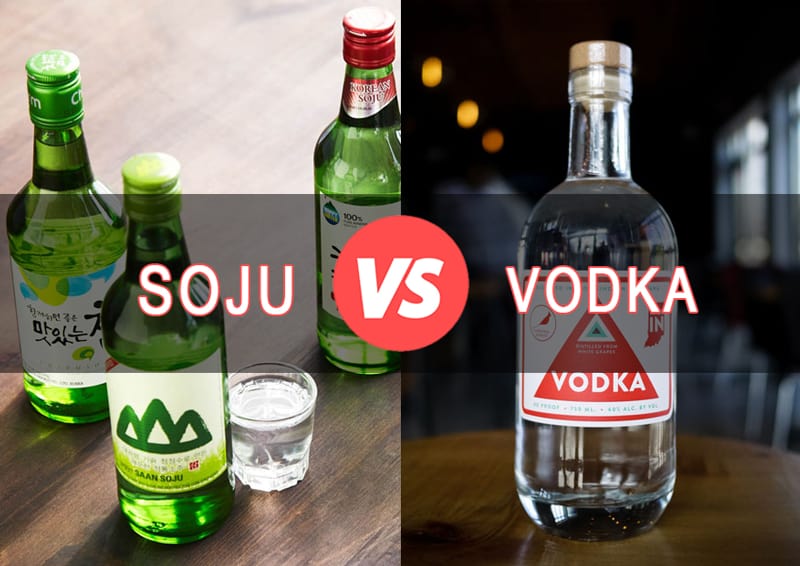Soju and vodka are like two cousins from different countries – they’re from the same family but with a twist. Both drinks are distilled liquors that can be drank in shots, mix well with other drinks, and can even be used for food.
Soju is a clear Korean spirit originally made from fermented rice. When rice was banned for making soju, people used wheat, sweet potatoes, or tapioca instead. Vodka, on the other hand, is also a colorless distilled alcohol that hails from Poland, Russia, and Sweden. It is made of ethanol and water but was originally made with cereal grains or potatoes.
Aside from origin, one of the main differences is their alcohol content. Soju has an average of 20% alcohol content level while vodka starts at 40% alcohol content level and goes as high as 96%.
In this guide, we’ll compare soju and vodka head-to-head in different categories to see how they hold up.
Soju vs. Vodka – Understanding the Differences
Soju vs. Vodka: Taste
Most of the soju sold today tastes sweeter than vodka. Due to the astringency, you will still note the bitter aftertaste underneath the sweetness. Vodka, on the other hand, is subtle and tastes like clear grain. These days, brands sell a variety of flavored soju and vodka to cater to different tastes. Soju’s top flavors are mostly fruity which complements its sweetness.
Some of the most popular are the following:
- Green grapes
- Peach
- Grapefruit
Meanwhile, vodka’s flavors are mostly bolder and more adventurous than soju’s. Although fruity flavors are still common, it is just the start of a wider range of flavors. Some of its most popular flavors are the following:
- Chocolate
- Red pepper
- Flower extracts
Soju Alcohol Content vs. Vodka
Soju is meant to be drank casually like beer, but its alcohol content is almost three times higher. Popular brands of soju have an alcohol content ranging from 16-20%. One of the notable trends in the soju industry is the gradual lowering of alcohol content to cater to the market’s growing need for health-conscious products.
After all, consumers wanted mild liquors that they can drink casually without getting blind drunk.
Vodka has an average alcohol content of 40%, and unlike soju, some brands developed higher alcohol content to serve their market. One of these products is the Spirytus Rektyfikowany 192 Proof vodka with a whopping 95% alcohol by volume % (ABV). This makes it one of the highest in the market right now.
Do take note that it’s not meant to be consumed neat and is mostly used in cocktail mixes.
Calories In Soju vs. Vodka
For calorie counters, here is a quick calorie guide for soju and vodka. Keep in mind that this is just a guide and the content can vary depending on the brand and the variant of the alcohol.
Soju:
Alcohol | ABV | Calories |
|---|---|---|
360ml Soju | 16-20% | 540 calories |
Soju’s caloric equivalent is almost 4 beers and gets higher when you opt for the flavored ones. It has more calories than one bowl of rice and has about 5 grams more sugar than a glass of soda.
Vodka:
Alcohol | ABV | Calories |
|---|---|---|
750ml Vodka | 45% | 1629 calories |
A single shot of vodka is just under 100 calories, but multiple shots can easily add up. If you have 3 vodka drinks, that’s 300 calories already which is basically the same as eating one fast-food cheeseburger. Calories will also increase as soon as you mix it with other sugary drinks.
Carbs In Soju vs. Vodka
For carb watchers, drinking unflavored vodka and soju is great since both don’t have it. Although both are made from carbohydrates like wheat and potatoes, carbohydrates were removed during the fermentation process. Still, you want to watch out since the flavored versions have carbohydrates in them due to the sugar component.
Final Verdict
Soju and vodka seem interchangeable at first glance. This guide highlights the subtle differences that set these drinks apart and make them unique. With lower alcohol content, soju is great for casual drinking. Vodka, on the other hand, is for cocktails and getting drunk.

